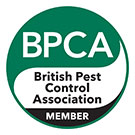GOT PEST PROBLEMS, GET IN TOUCH FOR A FREE QUOTE
- Telephone0141 432 0433
- Emailinfo@allpestservices.co.uk
- REQUEST A CALLBACK
Hide Beetle
The Hide Beetle [Dermestes maculatus] sometimes called the Leather Beetle breed in dried proteins and can be significant pests of hide factories and warehouses, butchers shops, bone/meal factories, poultry houses etc. They often occur in houses living in bird or rodent nests and infesting dead carcasses. Eggs are laid in batches of 200-800, hatching in 1-2 weeks.
Larvae are very active, avoiding light, often being found behind kick plates and under white goods in kitchens. They are brownish with long hairs over the body. Larvae burrow into hard materials to pupate, including wood and even tin.
Heavy infestations can cause considerable damage as a result. Life cycle from egg to adult is approx 8-12 weeks with adults living about 3 months.
Spider Beetle
There are two principal pest species of Spider Beetle namely the Australian Spider Beetle [Ptinus tectus] and the Golden Spider Beetle [Niptus hololeucus]. The name refers to their spider-like appearance but with only six legs they are actually insects.
Slow moving, they play dead when disturbed. They are often associated with bird nests and feed on any dry food matter. Before they pupate the larvae bore holes into items such as cardboard, books and even wood.
Adults can bite holes in carpets and bedding. Larvae can feed on woollens, linens and silks. Depending on species between 30-100 eggs are laid by the female with entire life cycle lasting 3-7 months.
Do you have a problem with beetles? We can help…
All Pest Services is a member of the British Pest Control Association (BPCA) and the National Pest Technician’s Association (NPTA), as well as being an approved member of the Confederation of European Pest Control Associations (CEPA). We are also Safe Contractor Approved.
Our staff have been specifically trained to undertake all types of insect control work and have many years’ experience in the profession. All our staff have achieved the Royal Society for Public Health Level 2 Award in Pest Management which is a requirement for members of the BPCA. All our staff also have specific qualifications in Insect Control and the Safe Use of Pesticides.
Although many pest species can be relatively easily controlled the key is correct identification. Incorrect identification of the pest species or extent of infestation are the most common reasons for failure. For this reason All Pest Services offer a bespoke service for most types of insect control. The first thing is to give us a call to discuss the problem. Some issues can be resolved without the need for treatment. Alternatively we can carry out a site survey to ensure the problem is correctly identified and efficiently dealt with.
All Pest Services is a member of the British Pest Control Association (BPCA) and the National Pest Technician’s Association (NPTA), as well as being an approved member of the Confederation of European Pest Control Associations (CEPA). We are also Safe Contractor Approved.
Our staff have been specifically trained to undertake all types of insect control work and have many years’ experience in the profession. All our staff have achieved the Royal Society for Public Health Level 2 Award in Pest Management which is a requirement for members of the BPCA. All our staff also have specific qualifications in Insect Control and the Safe Use of Pesticides.
Although many pest species can be relatively easily controlled the key is correct identification. Incorrect identification of the pest species or extent of infestation are the most common reasons for failure. For this reason All Pest Services offer a bespoke service for most types of insect control. The first thing is to give us a call to discuss the problem. Some issues can be resolved without the need for treatment. Alternatively we can carry out a site survey to ensure the problem is correctly identified and efficiently dealt with.
Although most insects do not cause us problems and many are benign or even beneficial even in our homes there are other insects that can cause problems. These may need controlling for reasons such as preventing the spread of disease, preventing damage to livestock and crops or property, preserving public health or public or safety. Some insects can bite or sting (such as Fleas, Bed Bugs or wasps) while others spread disease such as cockroaches which can spread diseases such as Staphylococcus spp., E Coli, Shigella spp., Salmonella spp. Other insects are significant because of their role in damaging or contaminating foodstuffs, such as Grain Weevil, Flour Beetle, Grain and Flour Moths etc.
Causing harm to any species, whether insect or otherwise, is a last resort. Some species, such as flies and night moths can be effectively controlled using Fly Screen Doors and Windows or the installation of Electric Fly Control Units. Others can be effectively managed by removing their food source. In many cases however a pesticide will be needed. All Pest Services can advise on the installation of Fly Screens and Fly Control Units as well as the safest and most appropriate pesticides where necessary.
This is a complex area and is governed by a wide range of legislation including the Food and Environment Protection Act 1985 Part 3 [FEPA], the Control of Pesticide Regulations 1986 [COPR], the Wildlife and Countryside Act 1981, the Control of Substances Hazardous to Health Regulations [COSHH], amongst others. If you’re unsure seek advice from a reputable pest control company like All Pest Services. Certain species such as honey bees, while not specifically protected, are becoming increasingly endangered and should not be destroyed apart from in extreme situations. In many cases a bee keeper will be able to remove them without causing any harm if it is absolutely necessary. Specific measures must be followed if control measures are required – please seek advice before you act!
GOT PEST PROBLEMS, GET IN TOUCH FOR A FREE QUOTE










